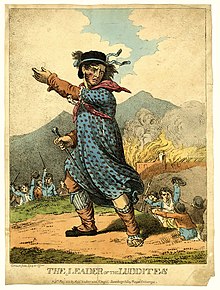
Back Luddisme Afrikaans لاضية Arabic Ludismu AST Ludçular Azerbaijani Лудити Bulgarian Luddisme Catalan Luddité Czech Ludiad Welsh Ludditter Danish Luddismus German

The Luddites were members of a 19th-century movement of English textile workers who opposed the use of certain types of cost-saving machinery, and often destroyed the machines in clandestine raids. They protested against manufacturers who used machines in "a fraudulent and deceitful manner" to replace the skilled labour of workers and drive down wages by producing inferior goods.[1][2] Members of the group referred to themselves as Luddites, self-described followers of "Ned Ludd", a legendary weaver whose name was used as a pseudonym in threatening letters to mill owners and government officials.[3]
The Luddite movement began in Nottingham, England, and spread to the North West and Yorkshire between 1811 and 1816.[4] Mill and factory owners took to shooting protesters and eventually the movement was suppressed by legal and military force, which included execution and penal transportation of accused and convicted Luddites.[5]
Over time, the term has been used to refer to those opposed to industrialisation, automation, computerisation, or new technologies or even progress in general.[6]
- ^ Cite error: The named reference
Conniffwas invoked but never defined (see the help page). - ^ "Who were the Luddites?". History.com. Retrieved 12 December 2016.
- ^ Binfield, Kevin (2004). "Foreword". Writings of the Luddites. Johns Hopkins University Press. pp. xiv. ISBN 1421416964.
- ^ Linton, David (Fall 1992). "The Luddites: How Did They Get That Bad Reputation?". Labor History. 33 (4): 529–537. doi:10.1080/00236569200890281. ISSN 0023-656X.
- ^ Cite error: The named reference
Trialswas invoked but never defined (see the help page). - ^ "Luddite"[dead link]. Compact Oxford English Dictionary at AskOxford.com. Accessed 22 February 2010.
© MMXXIII Rich X Search. We shall prevail. All rights reserved. Rich X Search